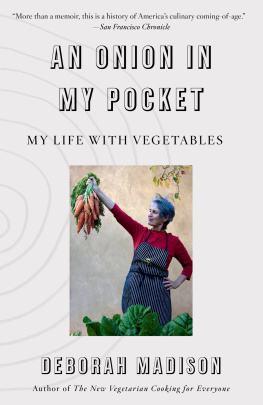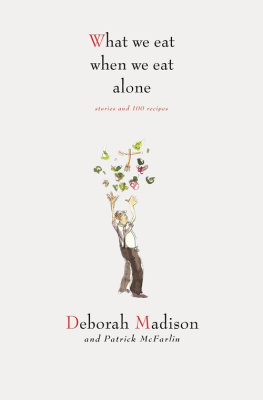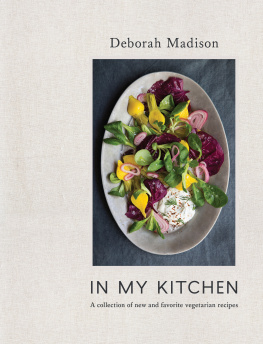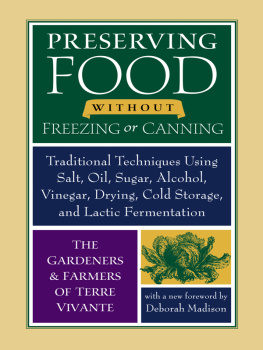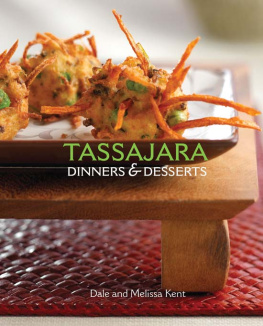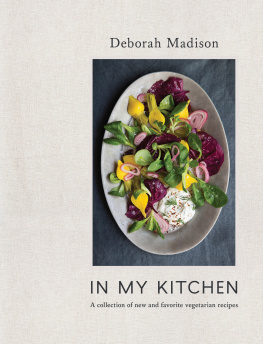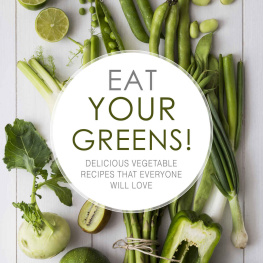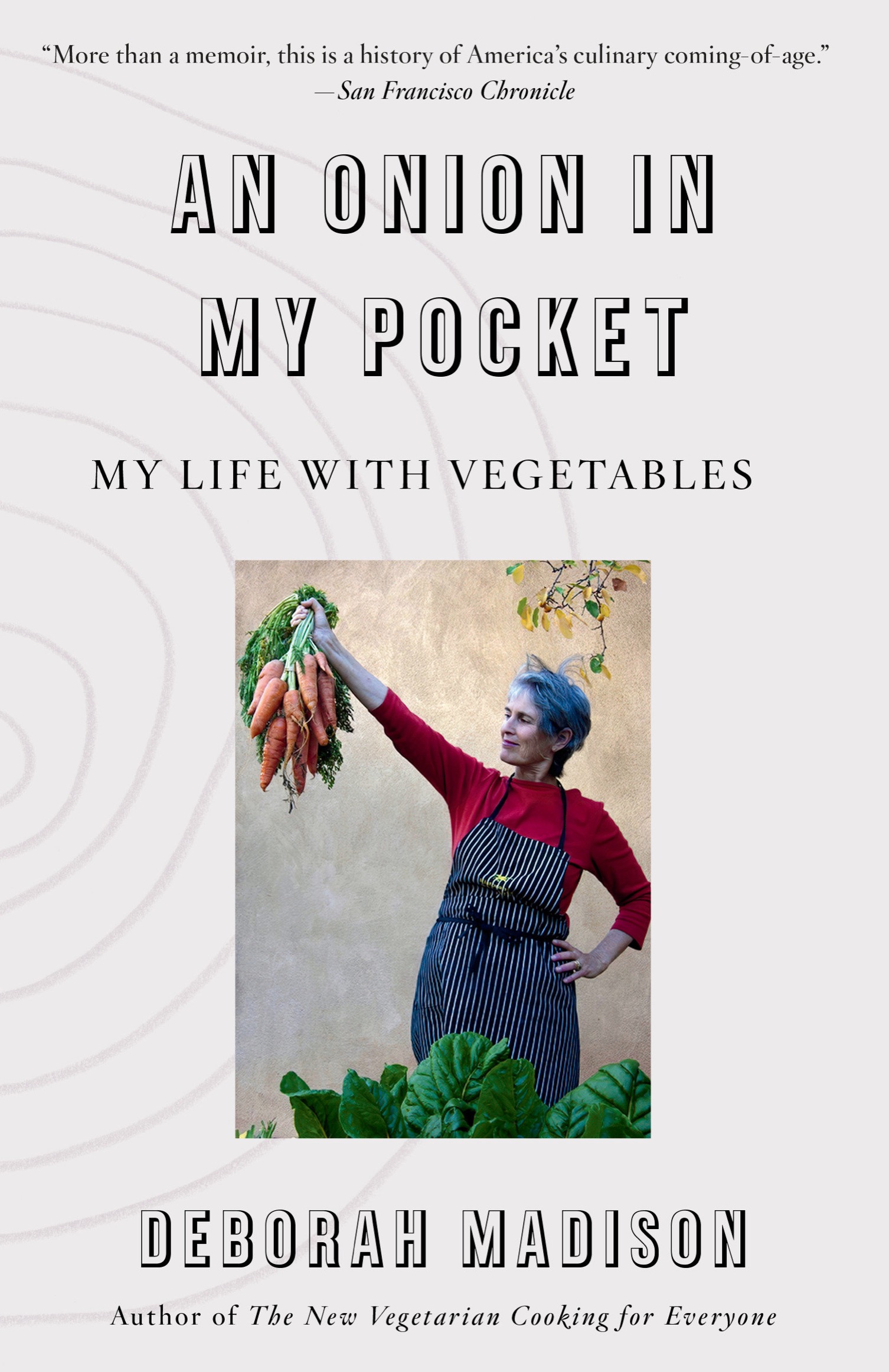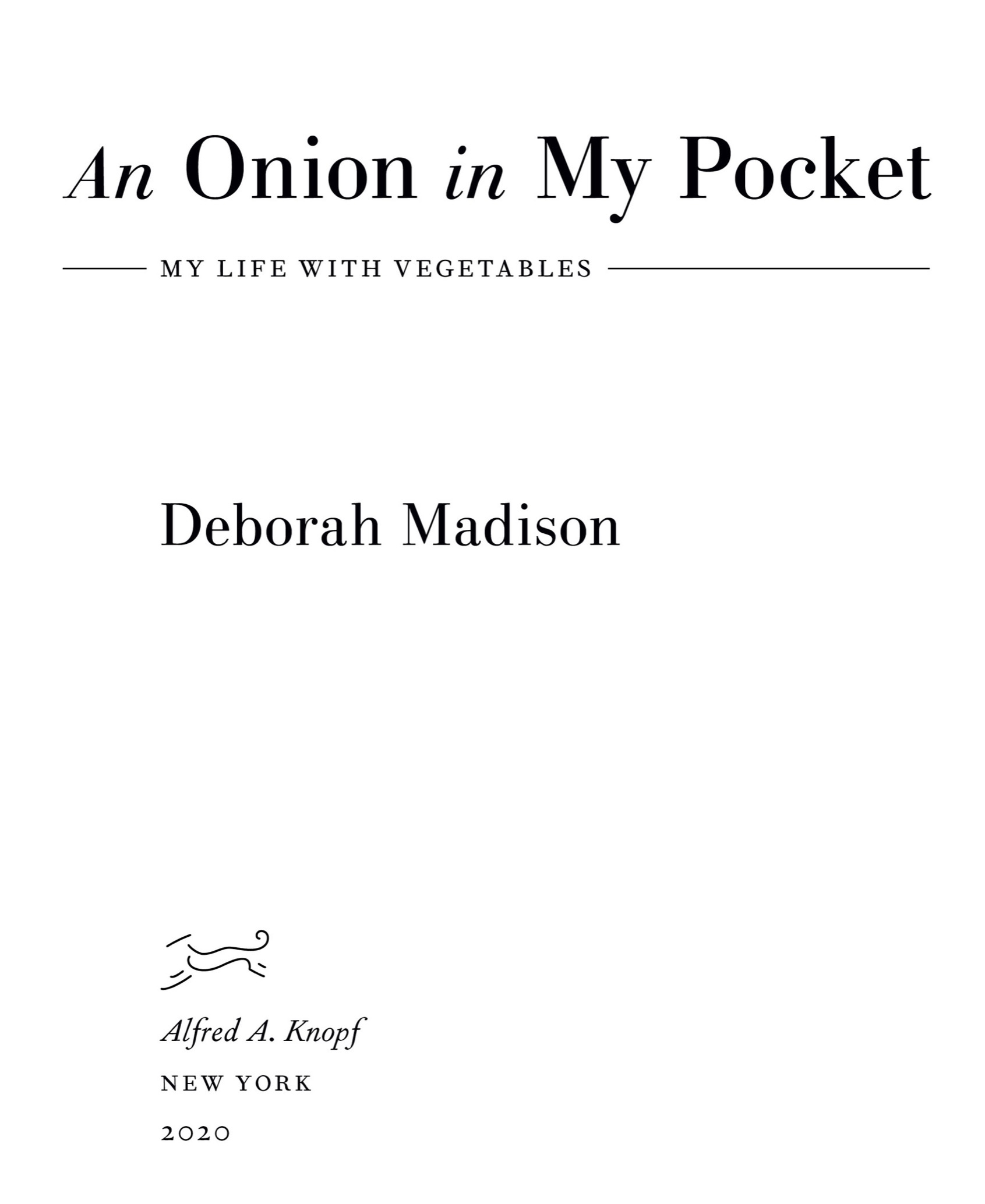ALSO BY DEBORAH MADISON
In My Kitchen
The New Vegetarian Cooking for Everyone
Vegetable Literacy
Seasonal Fruit Desserts
What We Eat When We Eat Alone
Vegetable Soups
Vegetarian Suppers
Local Flavors
This Cant Be Tofu!
Williams-Sonoma Vegetables
Vegetarian Cooking for Everyone
The Vegetarian Table: America
The Savory Way
The Greens Cookbook
THIS IS A BORZOI BOOK PUBLISHED BY ALFRED A . KNOPF
Copyright 2020 by Deborah Madison
All rights reserved. Published in the United States by Alfred A. Knopf, a division of Penguin Random House LLC, New York, and distributed in Canada by Penguin Random House Canada Limited, Toronto.
www.aaknopf.com
Knopf, Borzoi Books, and the colophon are registered trademarks of Penguin Random House LLC.
Grateful acknowledgment is made to New Directions Publishing Corp. for permission to reprint This Is Just to Say by William Carlos Williams, from The Collected Poems: Volume I,19091939, copyright 1938 by New Directions Publishing Corp. Reprinted by permission of New Directions Publishing Corp.
Library of Congress Cataloging-in-Publication Data
Names: Madision, Deborah, author.
Title: An onion in my pocket : my life with vegetables / Deborah Madison.
Description: First edition. | New York : Alfred A. Knopf, 2020. |
Identifiers: LCCN 2019039918 (print) | LCCN 2019039919 (ebook) | ISBN 9780525656012 (hardback) | ISBN 9780525656029 (ebook)
Subjects: LCSH : Madison, Deborah. | CooksUnited StatesBiography. | Food writersUnited StatesBiography. | VegetarianismUnited States. | Cooking (Vegetables) | Greens (Restaurant : San Francisco, Calif.)
Classification: LCC TX 649. M 326 A 3 2020 (print) | LCC TX 649. M 326 (ebook) | DDC 641.5092 [ B ]dc23
LC record available at https://lccn.loc.gov/2019039918
LC ebook record available at https://lccn.loc.gov/2019039919
Ebook ISBN9780525656029
Cover photograph by Patrick McFarlin
Cover design by John Gall
ep_prh_5.5.0_c0_r2
To the memory of my very different parents, each of whom made their best effort, and to my very much alive and equally different siblings
Contents
Introduction
Onions, Snakes, and What Matters
If there are not onions in my pockets or my purse, maybe there are shallots, or some amaranth leaves, or seeds collected from the garden, or something else food related. Once there was a four-foot-long gopher snake in my pursesafekeeping for the walk home. These snakes do lower the numbers of those garden pests. But there was a day when there actually was an onion in my pocket because I had been cooking with my pal Dan, and I had brought the onions that we needed for a pizza. There was one left over. In Spanish class I pulled out the extra onion and put it on the desk so I could find my notes and pensalso crammed into my pockets that day. People started to laugh. To me it was utterly normal.
Thats partially what it means to be a food personthat it is normal to find an onion in your pocket. Or that you fly home with quarts of fragrant berries on your lap, or you stuff a bag of superlong stalks of late-summer rhubarb into the overhead. Its likely that when a friend visits you in your new desert home she arrives with egg cartons in her suitcasea ripe fig nestled into each little depressionor that another friend arrives with an extra suitcase filled with quince. Food swirls around us. We reach out for some of it; other times we toss something good into the swirl for others to enjoy. Its the forever potlatch of gift and exchange.
I didnt always know Id be so involved with food and Ive long tried to piece together when it first happened, when food became something good and compelling. I think it was when I was sixteen. My parents had gone to Europe for a sabbatical and farmed each of their four kids out to another family. I got to live with a couple who did not have children, who had lived many times in France, who loved food and knew how to cook. Living with them I discovered that food could be good every night of the week. Given my parents uneven temperaments and my mothers frugality I had no idea that this could be so. But it was and it was miraculous. Cheese souffls, chicken poached in wine with mushrooms and cream, salads from the gardenit was all so delicious and it was all new to me. When my parents returned from their trip, they remarked on my new round face, evidence that butter and cream, predinner gin and tonics, and the much better wines we drankthe plenty of very good food and drink, in shorthad had an effect. When people ask me when I became interested in food, I tell them it was when I discovered that food could taste good. Every night of the week. These meals did change my life.
The man in my temporary household was, like my father, a botanist; only his specialty was alliums, not grass. Like all botanists and food people I have known, his eyes were open to all kinds of possibilities, especially culinary ones. Over a long weekend we took a trip to Mount Lassen. Once there and settled into our motel, we set out on a hike with the intention of spending the day on the trail. Shortly into our walk, I noticed some funny-looking things poking out of the ground. I asked what they were and the botanist and his wife both responded with ecstatic shouts: Morels! Theyre morels! We immediately filled our hats with them, abandoned the walk, and drove into town in search of butter and cream.
We simmered the morels in cream and piled them on buttered toast for lunch. They were magnificent and they taught me my first food rule: Break your plans in the face of something wonderful and utterly unexpected, like morels. Let them take over and push you here and there as they will. You will at least come away with a memory. This event is decades old, but it remains a vivid memory.
Despite this introduction to the pleasures of the table and my excitement about food tasting good, I didnt act right away. The thought I want to be a chef never occurred to me. Instead, I finished high school, went to college, dropped out, got back in, changed universities, graduated, got a job, went to Japan, then became a practicing, even ordained, Buddhist for about twenty years. It wasnt until I became a Zen student that I became interested in cooking and started to cook in earnest. Its supposed to be so austere, that Zen life, but people still have to eat and someone has to cook. That person became me in 1970.
Ive cooked for a long time: in the San Francisco Zen Center; at our monastery at Tassajara; at our farm, Green Gulch; at Alice Waterss restaurant in Berkeley, Chez Panisse; at Greens, the vegetarian restaurant I opened in San Francisco; at the American Academy in Rome; at Caf Escalera in Santa Fe; and at homewhen I finally got one. (I lived in community until I was forty.) At some point I decided to look back to find out what matters when it comes to food, and thats what this book is about.
Twenty Missing Years
I was twenty-one when I carried out a study for a professor at UC Berkeley interviewing people who had gone from rat-infested dark old dangerous Victorian buildings to what was considered to be a more enlightened concept of public housing than the monolithic high-rise apartment buildings that public housing programs usually produced. It was fascinating to go into the homes of people who were unlike anyone I knew and listen to them talk about their lives. But it was also discouraging. Despite their clean, safe, attractive new homes with nearby laundry rooms and grassy lawns for their children to play on, they were filled with complaints. They wanted bigger apartments; the laundry rooms were too far away; they wanted different playground equipment. I began to question human nature itself. And I had to ask myself if I really wanted to be a city planner. Did it make sense to work to satisfy peoples wants if theyd never really be, for once and for all, satisfied? This was my big question, not what to eat. Its what ultimately drove me to the Zen Center, but so did other things.

